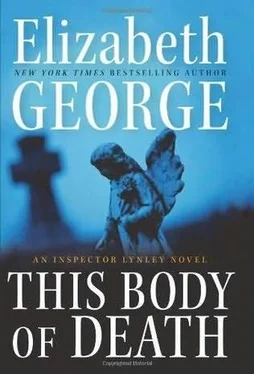There, Yolanda said, “Heed my warning.”
To which Bella said, “You bloody heed mine. Next time you show your face round here, you’ll be explaining your presence to the coppers. Understand? Now scarper.”
Yolanda started to speak. Bella made a threatening movement towards her. That apparently did it, because she hustled down the pavement in the direction of the river. Bella waited till she disappeared round the corner into Putney Bridge Road. Then she went back to what she’d intended to do. She grabbed the laundry basket and approached the serried rank of rubbish bins with their neat labels upon them.
It was in the Oxfam bin that she found it. Later she would think what a miracle it was that she’d opened that particular bin at all, for she emptied the Oxfam bin least often, as items for Oxfam were tossed away infrequently by herself, by residents of her house, and by people who lived nearby. As it was, she had nothing to deposit in the Oxfam bin on this day. She merely removed its lid to take note of when it was likely to need emptying. The newspaper bin was itself nearly full and the plastics bin was likewise; the glass bins were fine-separating green from brown from clear kept them from filling too quickly-and since she was looking at the bins in general, she’d gone on to the Oxfam bin as a matter of course.
The handbag was buried beneath a jumble of clothing. Bella had removed this with a curse about people’s enduring laziness as evidenced by the fact that they couldn’t be bothered to fold what they wished to have carted off to the charity and she was about to fold it all herself, item by item, when she saw the handbag and recognised it.
It was Jemima’s. There was no doubt about it, and even if there had been doubt, Bella scooped it up and opened it and there inside were Jemima’s purse, her driving licence, her address book, and her mobile phone. There were other bits and bobs as well, but these didn’t matter as much as the fact that Jemima had died in Stoke Newington where she’d no doubt had her handbag with her, and here it was now in Putney, as large as the life she no longer possessed.
There was no question in Bella’s mind what she had to do about this sudden discovery. She was headed for the front door with the handbag in her grasp when the front gate opened behind her and she turned, expecting to see Yolanda’s stubborn return. But it was Paolo di Fazio coming through, and when his eyes lit on the handbag that Bella was carrying, she saw from his expression that, like her, he knew exactly what it was.
BY RETURNING TO St. Thomas’ Hospital and remaining there for most of the previous night to await word on Yukio Matsumoto’s condition, Isabelle had managed to put off the meeting with AC Hillier. Since he’d instructed her to deliver herself to his office upon her return to the Yard, she’d decided merely not to return to the Yard until long after the assistant commissioner had vacated Tower Block for the night. This would give her time to sort through what had happened in order to be able to speak clearly about it.
That plan had worked. It had also allowed her to be first in line to know what was going on with the violinist’s condition. This was simple enough: He remained in a coma throughout the night. He was not out of danger, but the coma was artificial, induced to allow the brain time to recover. Had she been given suzerainty in this situation, Yukio Matsumoto would have been brought round and then thoroughly questioned once he’d emerged from the operating theatre. As it was, the most she was able to manage was a police guard in the vicinity of intensive care to make certain the man didn’t suddenly regain consciousness on his own, realise the depth of the trouble he was in, and do a runner. It was, she knew, a laughable possibility. He was in no condition to go anywhere. But appropriate procedure had to be followed, and she was going to follow appropriate procedure.
She believed she had done so from the first. Yukio Matsumoto was a suspect; his own brother had identified him from an e-fit in the newspaper. It was not down to her that the man had panicked and had tried to outrun the police. Besides that, as things turned out, he was in possession of what had to be the murder weapon, and when his clothing and his shoes had undergone analysis along with the weapon, there were going to be blood splatters somewhere upon them-no matter how minute and no matter how he’d tried to clean them-and those blood spatters would belong to Jemima Hastings.
The only problem was that this information could not be passed on to the press. It could not come out until a trial. And that was a problem indeed because the moment the word got out that a member of London’s foreign citizenry had been hit by a vehicle while running from the coppers-which hadn’t taken long-the press had gathered like the wolf pack they were, on the scent of a story that smacked of police incompetence. They were baying to bring down the responsible party, and the job of the Met was to position itself to handle things when the wolves closed in for the kill.
Which, naturally, was one of two reasons that Hillier had wanted to see her: to determine what the Met’s position was going to be. The other reason, she knew, was to assess if or how badly she’d cocked things up. Should he decide blame lay with her, she was finished, the opportunity for promotion gone.
The broadsheets that morning had taken a wait-and-see attitude, reporting the bare facts. The tabloids, on the other hand, were doing their usual. Isabelle had watched BBC1 as she’d made her preparations for the day, and the morning talking heads did their typical bit with both the broadsheets and the tabloids, holding them up for the delectation of their viewers and commenting upon the stories featured. Thus in advance of heading to the Yard, she knew that gallons of newsprint were being devoted to the “Copper Chase Disaster.” This gave her time to prepare. Whatever she reported to Hillier had to be good, and she damn well knew it. For once the papers connected the victim with his famous brother, which would hardly take long considering Zaynab Bourne’s threats of the previous day, the story would have even stronger legs. Undoubtedly then it would run for days. Things could have been worse, but Isabelle couldn’t quite see how.
She had an Irish coffee prior to leaving for work. She told herself that the caffeine would counteract the effects of the whisky, and besides, after being up for most of the night, she had earned it. She drank it down quickly. She also tucked four airline bottles of vodka into her bag. She assured herself that she likely wouldn’t need them, and anyway they were not enough to do anything but help her think clearly if she felt muddled during the day.
She stopped in at the incident room at work. She told Philip Hale to relieve the officer at St. Thomas’ Hospital and to remain there. His startled expression replied that as a DI, he should not be asked to do something that a uniformed constable could easily do, as it was a waste of manpower. She waited for him actually to make a comment, but he sucked in a breath and said nothing but, “Guv,” in polite response. No matter because John Stewart talked for him, saying laconically, “Due respect, guv…,” which, Isabelle knew, he felt nothing of anyway. She snapped, “What is it?” and he pointed out that using a detective inspector as some sort of single-headed Cerberus at the hospital when he could otherwise be handling what he’d earlier been told to handle-all of the background checks which were, by the way, mounting up-was hardly a wise use of Philip’s expertise. She told him she didn’t need his advice. “Get on to forensics and stay glued to them. Why’s the analysis of those hairs found on the body taking so long? And where the hell is DI Lynley?”
Читать дальше












